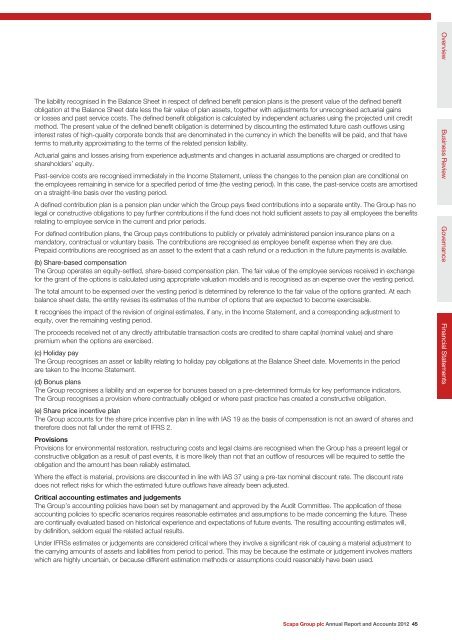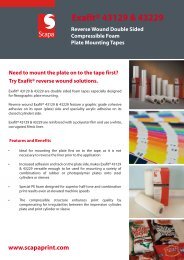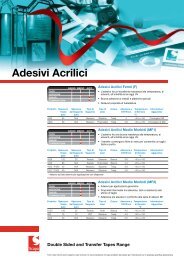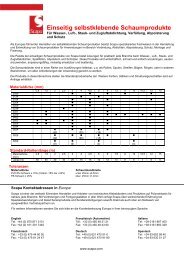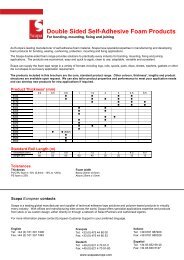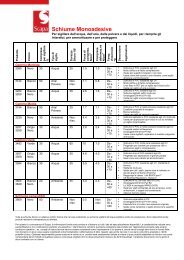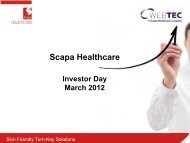Annual Report and Accounts 2012 - Scapa
Annual Report and Accounts 2012 - Scapa
Annual Report and Accounts 2012 - Scapa
You also want an ePaper? Increase the reach of your titles
YUMPU automatically turns print PDFs into web optimized ePapers that Google loves.
The liability recognised in the Balance Sheet in respect of defined benefit pension plans is the present value of the defined benefit<br />
obligation at the Balance Sheet date less the fair value of plan assets, together with adjustments for unrecognised actuarial gains<br />
or losses <strong>and</strong> past service costs. The defined benefit obligation is calculated by independent actuaries using the projected unit credit<br />
method. The present value of the defined benefit obligation is determined by discounting the estimated future cash outflows using<br />
interest rates of high-quality corporate bonds that are denominated in the currency in which the benefits will be paid, <strong>and</strong> that have<br />
terms to maturity approximating to the terms of the related pension liability.<br />
Actuarial gains <strong>and</strong> losses arising from experience adjustments <strong>and</strong> changes in actuarial assumptions are charged or credited to<br />
shareholders’ equity.<br />
Past-service costs are recognised immediately in the Income Statement, unless the changes to the pension plan are conditional on<br />
the employees remaining in service for a specified period of time (the vesting period). In this case, the past-service costs are amortised<br />
on a straight-line basis over the vesting period.<br />
A defined contribution plan is a pension plan under which the Group pays fixed contributions into a separate entity. The Group has no<br />
legal or constructive obligations to pay further contributions if the fund does not hold sufficient assets to pay all employees the benefits<br />
relating to employee service in the current <strong>and</strong> prior periods.<br />
For defined contribution plans, the Group pays contributions to publicly or privately administered pension insurance plans on a<br />
m<strong>and</strong>atory, contractual or voluntary basis. The contributions are recognised as employee benefit expense when they are due.<br />
Prepaid contributions are recognised as an asset to the extent that a cash refund or a reduction in the future payments is available.<br />
(b) Share-based compensation<br />
The Group operates an equity-settled, share-based compensation plan. The fair value of the employee services received in exchange<br />
for the grant of the options is calculated using appropriate valuation models <strong>and</strong> is recognised as an expense over the vesting period.<br />
The total amount to be expensed over the vesting period is determined by reference to the fair value of the options granted. At each<br />
balance sheet date, the entity revises its estimates of the number of options that are expected to become exercisable.<br />
It recognises the impact of the revision of original estimates, if any, in the Income Statement, <strong>and</strong> a corresponding adjustment to<br />
equity, over the remaining vesting period.<br />
The proceeds received net of any directly attributable transaction costs are credited to share capital (nominal value) <strong>and</strong> share<br />
premium when the options are exercised.<br />
(c) Holiday pay<br />
The Group recognises an asset or liability relating to holiday pay obligations at the Balance Sheet date. Movements in the period<br />
are taken to the Income Statement.<br />
(d) Bonus plans<br />
The Group recognises a liability <strong>and</strong> an expense for bonuses based on a pre-determined formula for key performance indicators.<br />
The Group recognises a provision where contractually obliged or where past practice has created a constructive obligation.<br />
(e) Share price incentive plan<br />
The Group accounts for the share price incentive plan in line with IAS 19 as the basis of compensation is not an award of shares <strong>and</strong><br />
therefore does not fall under the remit of IFRS 2.<br />
Provisions<br />
Provisions for environmental restoration, restructuring costs <strong>and</strong> legal claims are recognised when the Group has a present legal or<br />
constructive obligation as a result of past events, it is more likely than not that an outflow of resources will be required to settle the<br />
obligation <strong>and</strong> the amount has been reliably estimated.<br />
Where the effect is material, provisions are discounted in line with IAS 37 using a pre-tax nominal discount rate. The discount rate<br />
does not reflect risks for which the estimated future outflows have already been adjusted.<br />
Critical accounting estimates <strong>and</strong> judgements<br />
The Group’s accounting policies have been set by management <strong>and</strong> approved by the Audit Committee. The application of these<br />
accounting policies to specific scenarios requires reasonable estimates <strong>and</strong> assumptions to be made concerning the future. These<br />
are continually evaluated based on historical experience <strong>and</strong> expectations of future events. The resulting accounting estimates will,<br />
by definition, seldom equal the related actual results.<br />
Under IFRSs estimates or judgements are considered critical where they involve a significant risk of causing a material adjustment to<br />
the carrying amounts of assets <strong>and</strong> liabilities from period to period. This may be because the estimate or judgement involves matters<br />
which are highly uncertain, or because different estimation methods or assumptions could reasonably have been used.<br />
<strong>Scapa</strong> Group plc <strong>Annual</strong> <strong>Report</strong> <strong>and</strong> <strong>Accounts</strong> <strong>2012</strong> 45<br />
Overview Business Review<br />
Governance<br />
Financial Statements


